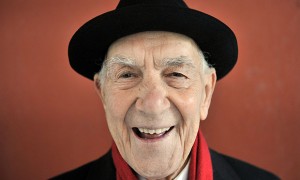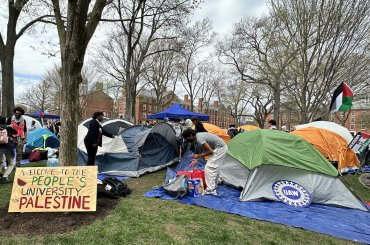On April 24, the French consulate in New York will present a Night of Philosophy: 62 lectures in 12 hours.
Kicking off the marathon in the ballroom on the second floor is a prestigious public figure, philosopher Monique Canto-Sperber. The President of a Parisian university, Canto-Sperber for many years hosted a weekly radio program on France Culture called “Questions d’éthique” (and has a great sense of style).
Her subject on April 24 is “Freedom of Speech.” It seems clear from the summary that follows that she will be talking about the Charlie Hebdo caricatures. And I bet she will endorse Charlie Hebdo’s right to publish cartoons of the prophet but also urge that publications show restraint.
Freedom of speech lies at the heart of the liberal state. It requires that every citizen be entitled to freely express his or her opinions, however irrational, outrageous or immoral these opinions may be. The rationales of such fundamental freedom are many, but they all carry limitations which makes its defense plausible. For example, those who argue that freedom of speech conveys the respect due to the individual must acknowledge that it could be used in such a way as to exert a prejudice towards other people, therefore appropriate limitations are required. That is the common understanding of freedom of speech. Nevertheless, elements of contemporary culture, linked mainly to the formation of opinions and beliefs, seem to shed a different light on this value and the ways it could be defined. Can we go along with the traditional concept of freedom of speech which constitutes the liberal state? Or should we reconsider?
Hold on a second, though. In 2011, Canto-Sperber, a former Director of the École normale supérieure from 2005 to 2012, she has been notoriously cancelled two meetings at the Ecole Normale Supérieure, of which she was then director, because they were sponsored by a Collectif Palestine, which favors the boycott, divestment sanctions campaign (BDS) against Israel. One of those gatherings was to feature Stéphane Hessel, the late and glorious writer who inspired the occupy movement (and who died two years after the cancellation).

Academics were outraged by the cancellation and organized this excellent petition citing the school’s long history of activism:
We, the undersigned U.S., Canadian and British academics, many of us with long connections to France, and who have long admired the historic role of the École Normale supérieure in the critical and intellectual life of the country, are dismayed at recent events at the school. The actions of the Director, Monique Canto-Sperber, first banning a talk by Stéphane Hessel and then refusing to allow the Colléctif Palestine ENS to hold a meeting on campus, is a denial of the rights of freedom of expression and freedom of assembly. Hessel is 93, a former ENS student, member of the Resistance, survivor of Buchenwald, one of the authors of the UN Declaration of Human Rights and of the recent best-selling Indignezvous!/Time for Outrage, in which he (among other things) criticizes Israel’s treatment of Palestinians…
The action of the Director is an exception to the school’s customary toleration of political action by students and it is a recurring exception, aimed at silencing one side in a needed debate about the Israel/Palestine conflict. We believe that the Director’s action contravenes a long history of free speech and political expression at the ENS as described in its own publicity : “For decades, the ENS has been the most prestigious site of French intellectual and scientific life. It participated in all the great intellectual debates of modern France, from the Dreyfus Affair to the movements of the 1930’s, and from the foundation of the human sciences to the avant-garde movements of the 1970’s.”
We call upon the Director to reverse her decision and to restore academic freedom, a practice long associated with this distinguished institution.
Canto-Sperber was embarrassed by the petition, which got international attention. She issued this defense in English of the censorship to Joan Wallach Scott, a leading historian at Princeton’s Institute for Advanced Study. Canto-Sperber said it had nothing to do with Hessel himself. He was always welcome. But the event was one-sided.
The ENS is open to debates in which both sides of an argument are presented and no political manipulation occurs. These two aspects were clearly missing in the two events.
What a standard. How would it have fared during Vietnam, Algeria, or the civil rights movement? Can you imagine holding a meeting during the Dreyfus Affair and hosting Zola but then getting the other side?
And Canto-Sperber said, the presentation was anti-semitic:
[B]oth meetings were monitored by the organizers of the boycott campaign of the Israeli state. I take no position personally on the moral legitimacy or illegitimacy of this initiative. I just want you to know that the boycott of a State is illegal under French law, as well as anti-Semitic discourse.
If it’s anti-Semitic, isn’t that immoral?
The response to Canto-Sperber’s defense of the censorship is so good it needs to be excerpted at length. Notice that they hint at official pressure on Canto-Sperber to crush free speech:
It should not be necessary to stress that everyone involved with this petition is firmly opposed to anti-Semitism in all its forms. We have seen nothing to suggest that members of the committee that attempted to organize the two events cancelled by the Director were in any way motivated by anti-Semitism, and we are concerned that accusations of anti-Semitism, a very grave offense indeed, are being made frivolously in order to silence one side in a needed debate about the Israel/Palestine conflict.
As for the question of the one-sidedness of the banned meeting, we don’t see a problem. Many meetings that take place at ENS and elsewhere do not require that every opinion on a matter be presented. It is not a matter of representing opposing views, and achieving “balance”, but of hosting events that ask serious questions about the relationship between discrimination, occupation, social justice, and international law. There is a long tradition at ENS that has done precisely that.
Those of us who circulated the petition were aware that the banned events were organized in connection with an initiative in favor of boycott, divestment, and sanctions as a possible response to what are widely seen as Israeli violations of international law. The petition took no position on this initiative, and a number of those who signed the petition have gone on record in opposition to the academic boycott in particular. It is safe to say, however, that everyone who signed the petition was deeply disturbed to learn that the boycott, a long established tactic of non-violent political mobilization, can simply be ruled illegal in France.
One might have thought that such illegality should be of concern to the ENS, the subject for a seminar or conference, and that the director would make an appropriate statement opposing such a blatant contradiction of international legal precedent, rather than seeking the support of a court for the bannings and taking refuge in the statement of that court.
If the director of one of the most prestigious institutions of French scholarship feels she faces unspecified sanctions for allowing a meeting on campus to discuss the exercise of what is elsewhere recognized as a fundamental democratic right, then freedom of speech in France is in greater danger than we feared.
[The authors are Natalie Zemon Davis, of the University of Toronto; Michael Harris, Professor of Mathematics, Université Paris-Diderot; Jonathan Rosenhead, Emeritus Professor of Operational Research, London School of Economics; and Joan Scott]
I wonder how Canto-Sperber will address her own suppression of the discussion of BDS in her lecture in the ballroom of the French consulate, which, by the way is free and open to the public.



Slightly O/T
Friday April 10 –
Conference (live) – The Israel Lobby: Is it good for the US ? Is it good for Israel ?
http://israellobbyus.org/
“free speech” is, presumably, the code name for suppression of a particular characteristic.
If propounding boycott of a State is illegal in France, then those who do so (the BDS community, if any, in France) should expect to be arrested.
Same if: no need to mention the rather serious (and rather different) allegation of antisemtiism: if a meeting would violate French law, that is a sufficient reason to ban the meeting. Period. Adding “antisemitism” (and should not the allegation of antisemitism itself be a serious defamation and therefore actionable as libel?) seems unnecessary and therefore seems either the real reason or else a sop to Zionists. She, as administrator, had no apparent need to make a sop. So one assumes that there was secret pressure brought to bear and that such pressure (as usual in USA) was the real reason for banning the meeting.
How has BDS fared in France since then? Anyone arrested? Can anyone quote the statute or other source of French law that (so it is claimed) makes it illegal to boycott (or to propound a boycott?) of a State?
BDS France is alive and kicking, especially the Toulouse chapter where the city mayor is campaigning against BDS. There has been 3 or 4 arrests and court actions against boycotters that made scenes at 2 Carrefour Supermaket branches and their position is that they are boycotting Israeli settlement products and not Israel itself. BDS France was very busy in the last few weeks with Israeli Apartheid Week events all over the country.
Their website:
http://www.bdsfrance.org/
“(and has a great sense of style).”
lol, what a funny embed!!!